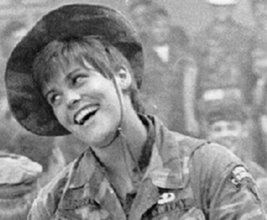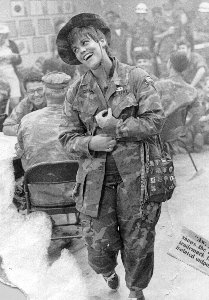
Donut Dollie Diary:
The
Long and Painful
Road to Healing
by: George F. Slook
© 1999
Donut Dollie Diary:
Susan Bradshaw McLean - 1990
By all outward appearances,
Susan Bradshaw McLean is normal in every respect. She is a single parent of a teenage daughter and an adult son. She is well educated, with a graduate degree in special education. She is employed as a dropout prevention teacher, educating juvenile sex offenders. During the week, she plays bridge with the neighborhood ladies and has breakfast with friends on the weekend. She is bright and personable. She does meaningful work.
Susan has it all. She should be happy. But something inside is "broken" and needs to be "fixed".
Susan is a Vietnam Veteran. In common
vernacular, these words suggest a military role. However, Susan and
hundreds like her served their country as members of the American Red
Cross. She was a "Donut Dollie." Officially considered a
civilian, she provided recreational services for the troops at war. Much
as many military veterans today bear the troubling images of Vietnam,
civilian veterans carry similar burdens. What Susan feels inside is
different from what people see on the outside. She calls it
"pretending." What Susan does is the sum of a lifetime of
experiences. What she feels is the product of a year of war. For 19 years
after her return from Vietnam, Susan pretended to be normal. Few knew the
turmoil brewing inside. Then things began to change. The deep feelings
that had been trapped for so long inside her began to surface. She didn't
want to pretend anymore. She embarked on a journey to heal her unseen
wounds and to find closure of the Vietnam nightmare. 
So how is it that emotional wounds of so
long ago emerge decades later? How does this process provide an
opportunity to finally put the past behind? Once injured, the human body
has a remarkable ability to protect itself from further harm.
Unfortunately, the body's natural defense mechanism is sometimes too
efficient. Much as an infected flesh wound can appear to be healed under
new-grown skin, so too can the emotional scars of war be trapped deep
inside the mind. On the surface, both mind and body can appear hearty and
hale, while deep inside the poison festers. Both types of wounds need to
be reopened and treated in order to get well again. Otherwise, the poison
spreads with hurtful consequence.
In 1990, Susan was invited to attend an
anniversary reunion of the 101st Airborne Division in Washington, DC. The
unit was celebrating its 45th year as a division and the 50th year of
airborne infantry. After a number of days of hardy revelry, she attended a
memorial service on Sunday morning at RFK stadium. A troop of fresh
recruits from Fort Campbell, Kentucky was brought in to participate in the
ceremonies. They were wide-eyed 18 year-olds, full of military vim and
vigor. Their "Leave it to Beaver" faces helped her realize how
very young we were when we went to war.
The audience was arranged so that rows of
troopers alternated with rows of veterans. After the memorial readings,
the veterans in the audience were asked to stand and be recognized for
their service. Susan instinctively rose to her feet. All were asked to
show their appreciation for those who survived the war. A young recruit in
front of Susan turned around and looked into her eyes. "I expected an
obligatory Thank You and handshake. Instead, I heard him say "Ma'am -
If I ever have to go to war, I hope someone is there for me - as you were
there for them." I felt a sudden warmth engulf my body. My eyes began
to fill. The tears started to flow. I started something I couldn't stop. I
cried all the way home and for two weeks after. I later got the word that
the Ft. Campbell troop had shipped out to the Persian Gulf for operation
Desert Storm."
For the first time since her return, Susan
felt appreciated. The sacrifices of Susan and her compatriots did make a
difference. The long and painful road to healing had begun.
George F. Slook, E-5
4th Infantry Division
Pleiku and An Khe
1969-1970

Trying to
locate: Anyone who served with me.
Branch of Service: Other Unit was:
Where served: An Khe, Đà Nẵng, Quang Tri, Qui Nhon
When served: 1970 - 71
Message is:
Please contact: Susan Bradshaw McLean
Mailing address: 1019 Wyndham Way
City, State, Zip: Safety Harbor, Fl 34695
Or send email to
Susan Bradshaw McLean using this automatic email.
|

